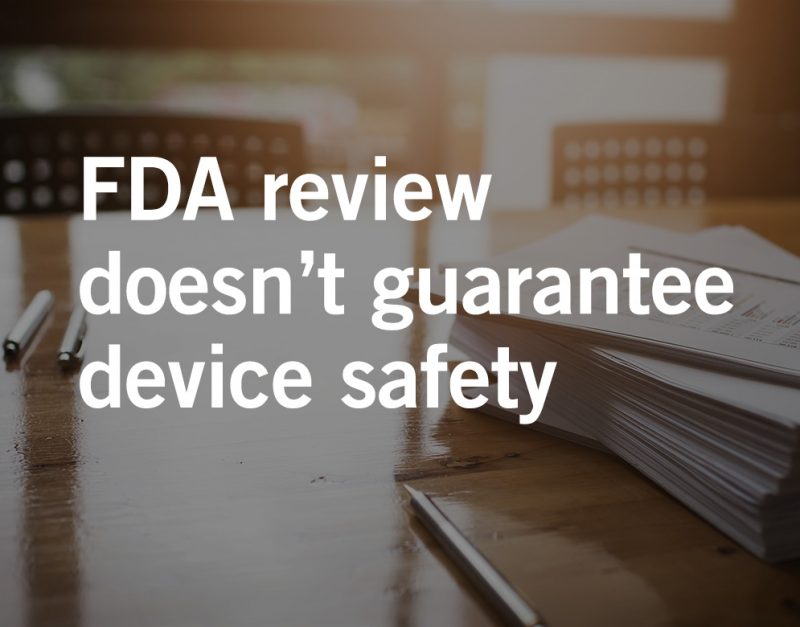 May 16, 2019
May 16, 2019 Medical device makers gaming the FDA approval system are endangering millions of Americans in the race to compete. Some are even committing medical device fraud.
More than 200,000 malfunctioned medical devices and over 2,000 device-related deaths are reported each year — sometimes leading to medical device injury lawsuits. These cases and more show that some medical device manufacturers forego product testing in the race to market and to the detriment of the public. Still, other manufacturers may lie about their product’s FDA approval status, resulting in false claims and medical device fraud. Our firm represents medical device clients that have suffered firsthand from manufacturers’ rush to compete. Many patients have turned to the courts to seek recovery.
CTA: Were you the victim of a failed medical device? Talk to a lawyer today for a free consultation.
Many medical devices relieve pain, improve quality of life, and even save lives. Yet many medical devices blamed for sickening and even killing patients have led to hundreds of thousands of legal cases. Many of those injured claim that they were harmed by a device that went on the market without first being tested in clinical trials to make sure it was safe and effective.
FDA Responsibility to Patient Safety and Preventing Medical Device Fraud
Assuring patients and healthcare providers have timely and continued access to safe, effective, and high-quality medical devices is the responsibility of the Food and Drug Administration (FDA). To do this, the FDA regulates a wide range of medical devices by dividing them into categories. They are classified based on the risks associated with the use of the device.
- Class I – Devices that present minimal potential for harm to the user. This class makes up 35% of medical devices, 93% of these are exempt from pre-market review. Examples: enema kits, elastic bandages.
- Class II – Devices that present a moderate risk of harm to the user. Class II makes up 53% of device types. Most require FDA review through premarket notification (510(k)). Examples: powered wheelchairs, some pregnancy test kits.
- Class III – Devices that sustain or support life, are implanted, or present potential high risk of illness or injury. Class III makes up 9% of device types, requires FDA review through premarket approval (PMA) or humanitarian device exemption (HDE). Examples: implantable pacemakers, hernia mesh, IVC blood clot filters.
- Unclassified/Not classified – Devices that the FDA has not yet classified. This category makes up just 3% of device types.
Manufacturers must provide information about their medical devices to the FDA for review through three different processes prior to marketing and sale.
- Premarket Notification [510(k)] – Submission required to demonstrate that the device is substantially equivalent to a device already placed into one of the three device classifications before it is marketed.
- Premarket Approval (PMA) – Application required to demonstrate that the device is safe and effective when used. Class III devices require a PMA, which is the most stringent type of device marketing application.
- Humanitarian Device Exemption (HDE) – Marketing application for a Humanitarian Use Device (HUD). A HUD is a medical device that is intended to benefit patients in the treatment or diagnosis of a disease or condition that affects less than 8,000 individuals in the United States per year.
Once the review is complete, in order for medical devices to then be sold in the United States, the FDA must decide to clear or approve the products. Medical devices with FDA clearance are products that the FDA has determined to be substantially equivalent to another legally marketed device. Medical devices with FDA approval come from the Class III category (the ones with the highest risk factor). These devices undergo a more rigorous review process than the ones that only have clearance (or are substantially equivalent).
Medical Device Manufacturers’ Responsibility
Manufacturers are expected to do their due diligence in completing thorough and rigorous testing to ensure their medical device products are safe and effective. As part of the FDA review process, manufacturers are responsible for submitting accurate and factual documentation about their products. This allows the FDA to make sound judgments about the integrity of potentially life-changing medical equipment. Manufacturers are expected to market their medical devices only for FDA approved/cleared uses. They are required to report any complications that occur after their medical devices go on the market, including injury and death. Medical device manufacturers should also issue voluntary recalls when they discover that their products prove to be a danger to the public. However, some manufacturers may be less than truthful during the review process or fail to issue recalls.
How Medical Device Safety Affects You
What happens when the review process fails? What happens when consumers must deal with further disruption to their lives because of a faulty medical device? Even if complications are reported to medical device manufacturers, it is often up to the manufacturers to decide if a serious injury or death is related to their device.
How Waters Kraus Paul & Siegel can Help
Manufacturers must be held accountable for the marketing and sale of these dangerous devices. Waters Kraus Paul & Siegel is a leader in medical device litigation and has the in-depth experience and commitment to see every claim through until justice is done.
Waters Kraus Paul & Siegel has been representing people injured by dangerous products and for over 20 years. We treat our clients with the utmost compassion while aggressively representing their case. Our clients are not just case numbers. They are real people dealing with the biggest issues they will ever face. We stand with them, however long and whatever it takes until justice is done. To learn more about Waters Kraus Paul & Siegel, or to have one of our medical device lawyers review your potential case, contact us by email or call 800.226.9880.


